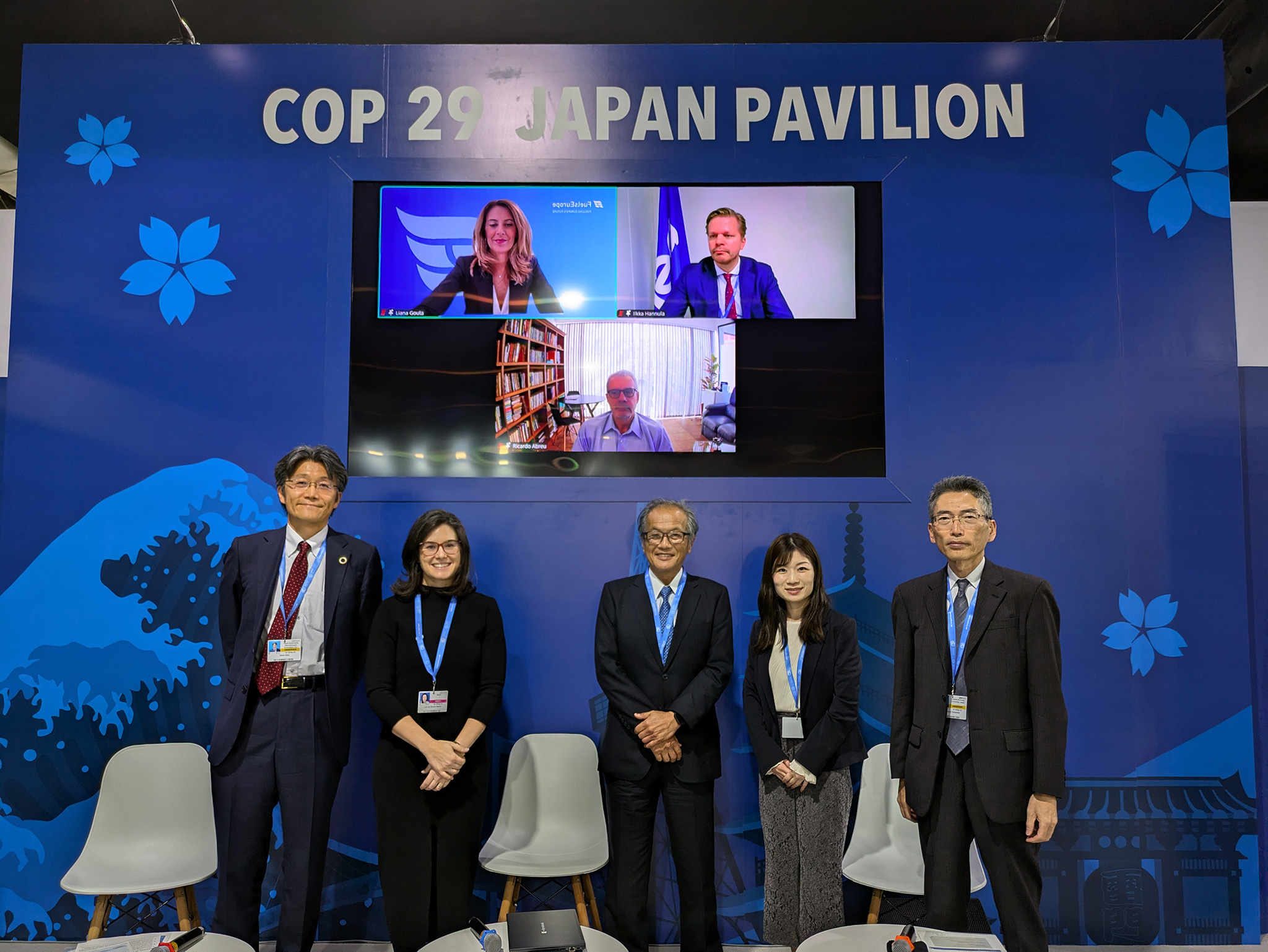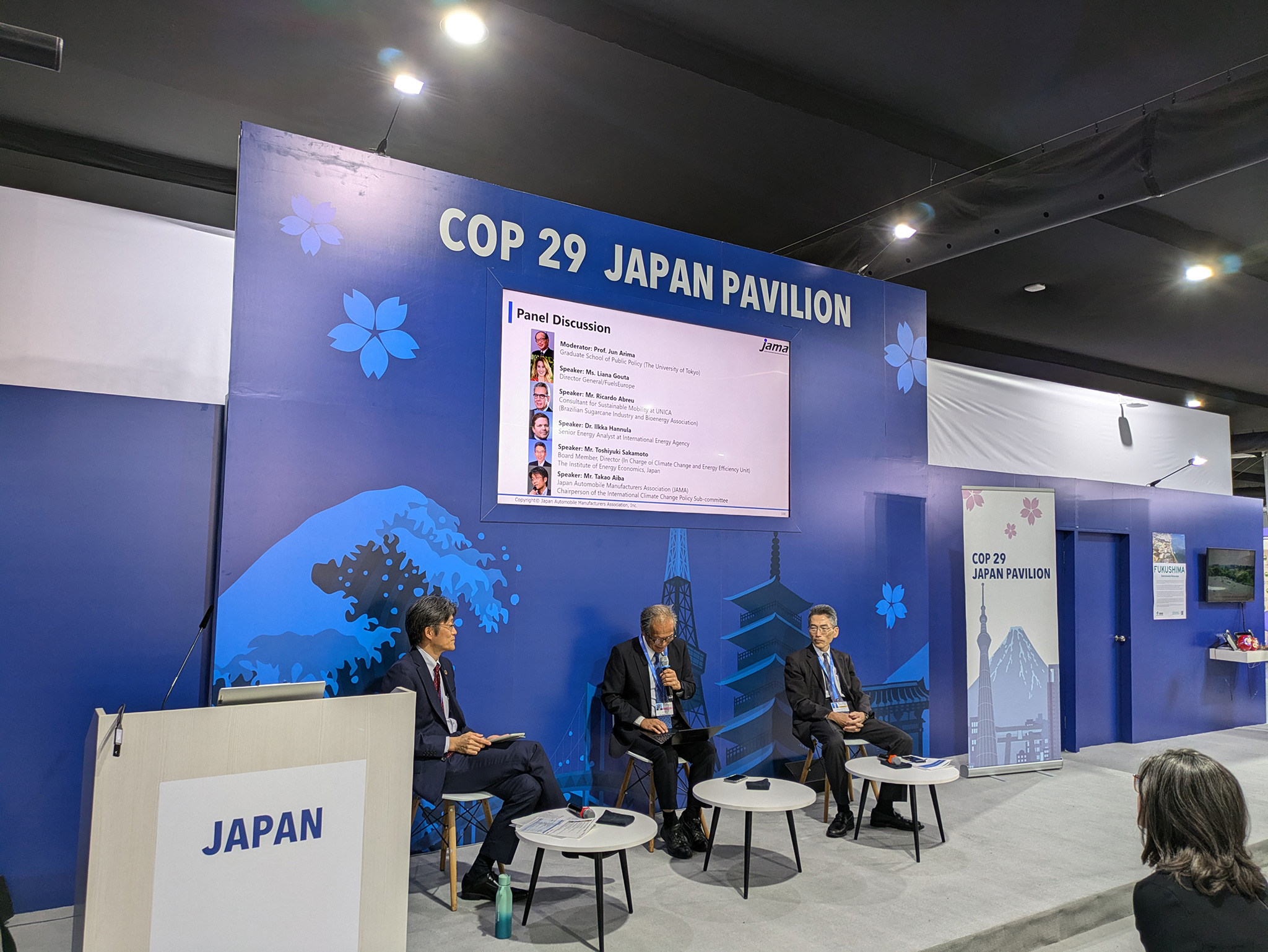JAMA's Side Event at COP29 (Baku, Azerbaijan, November 11-22, 2024)
1. Session Abstract
On November 20, 2024, a side event titled “Diversity in Carbon NeutralityーImportance of Carbon- Neutral Energy” was held at the Japan Pavilion during COP29 (officially, the 2024 United Nations Conference of the Parties of the UN Framework Convention on Climate Change) hosted by the Japan Automobile Manufacturers Association (JAMA).
In opening remarks, government representatives from Japan and Brazil discussed the Initiative for Sustainable Fuel and Mobility, or ISFM, an international framework launched in May 2024 to promote carbon neutrality (CN) by integrating sustainable fuels with high-performance mobility solutions such as hybrid engines. Those speakers emphasized the importance of reducing emissions throughout the entire life cycle of vehicles.
The event featured a panel discussion on decarbonization in the road transport sector which was moderated by Professor Jun Arima from the University of Tokyo and whose participants included representatives from the fuel industry in Europe and Brazil as well as energy think-tank experts from Europe and Japan.
Panel Participants:
- Jun Arima*
Project Professor, Graduate School of Public Policy, University of Tokyo
Leading author of IPCC AR6 WG3 Chapter 1, “Introduction and Framing”
*Moderator - Arisa Yonezawa*
Deputy Director, Automotive Industrial Strategy Office, Manufacturing Industries Bureau Ministry of Economy, Trade and Industry, Japan
*Opening remarks - Laís de Souza Garcia*
Head of the Renewable Energies Division Ministry of Foreign Affairs, Brazil
*Opening remarks - Liana Gouta
Director General, FuelsEurope - Ricardo Abreu
Consultant for Sustainable Mobility
Brazilian Sugarcane and Bioenergy Industry Association (UNICA) - Ilkka Hannula
Senior Energy Analyst
International Energy Agency (IEA) - Toshiyuki Sakamoto
Board Member, Director in charge of Climate Change and Energy Efficiency Unit
The Institute of Energy Economics, Japan (IEEJ) - Takao Aiba
Chair, International Climate Change Policy Subcommittee
Japan Automobile Manufacturers Association (JAMA)
2. Summary of Panelists’ Comments
In her opening remarks, Ms Yonezawa from the Ministry of Economy, Trade and Industry highlighted the importance of pursuing decarbonization via various pathways taking into account each country's circumstances, with the aim of reducing emissions from vehicle fleets and throughout the life cycle of vehicles. She specifically discussed the effectiveness of combining sustainable fuels, such as biofuels, with high-performance mobility solutions like HEVs, and expressed the intention to promote this strategy through ISFM and other channels in Japan-Brazil collaborative efforts leading up to COP30 in Brazil in 2025.
Ms Garcia from Brazil’s Ministry of Foreign Affairs addressed the current situation in Brazil regarding the revitalization of industry through the integration of renewable fuels with flex-fuel vehicles and HEVs. She emphasized the importance of a decarbonization approach that takes into account entire life cycles based on scientific evidence and the necessity of investing in a variety of options to enhance energy security.
Ms Gouta from FuelsEurope highlighted the fuel manufacturing industry’s fully endorsement of the EU’s climate neutrality ambition, and stressed that renewable fuels, by replacing gradually fossil fuels, have a vast potential to accelerate the decarbonisation of road transport. Building on the momentum from the G7 Turin Statement, she underlined the importance to advance dialogues with governments, international organizations and agencies toward tangible outcomes on renewable fuels, promoting environmental sustainability, innovation, and creating value for communities.
Mr Abreu from UNICA discussed the significant CO2 emissions reduction effects and job creation benefits associated with bioethanol production as well as the importance of life cycle assessment. He also affirmed that there are no concerns regarding deforestation and food competition from bioethanol production in Brazil while stressing the need to establish sustainable ethanol production methods.
Dr Hannula from the IEA discussed the crucial role of low-emission fuels in clean energy transitions, the need for common criteria for sustainable fuels, the establishment of an LCA-based emissions evaluation system, and the creation of incentive systems (such as a tiered labelling system) that reward improved GHG performance. He also highlighted the importance of collaboration with relevant stakeholders, including international organizations and the steel industry.
Mr Sakamoto from The Institute of Energy Economics, Japan, spoke about the potential role of biofuels and synthetic fuels in decarbonizing the road transport sector, the multiple pathways to achieve decarbonization based on national and regional circumstances, LCA assessments of passenger car GHG emissions in the EU, Brazil, etc, and the significant contribution of carbon-neutral fuels to decarbonization efforts in Brazil.
Mr Aiba of JAMA explained that the organization is making maximum efforts towards carbon neutrality and promoting a “multi-pathway” approach that takes into account the diversity in regional circumstances. He also highlighted the importance of steadily reducing emissions while leveraging international cooperation on sustainable carbon-neutral fuels, such as via the ISFM and the Turin Joint Statement on Sustainable Biofuels.
3. Concluding Remarks by Professor Arima
- The role of sustainable CN fuels in the multi-pathway approach is essential, and the government's role in providing investment support and incentives is a key element for their successful deployment.
- Life Cycle Assessment (LCA) evaluation is crucial and common standards for assessing the performance of sustainable fuels are also needed.
- International cooperation towards the development of sustainable fuels should be advanced, with a view to COP30 to be held in Brazil in 2025.
Presentations by Each Speaker
Speaker |
Presentation |
|---|---|
Liana Gouta (FuelsEurope) |
The role of renewable fuels in the decarbonisation of transport |
Ricardo Abreu (UNICA) |
An overview of the Brazilian Sugarcane and Bioenergy Industry and opportunities |
Ilkka Hannula (IEA) |
|
Toshiyuki Sakamoto (IEEJ) |
Quantitative Analysis on Multi-pathway Approach toward Carbon Neutrality in Road Transport Sector |
Takao Aiba (JAMA) |
Diversity in Carbon Neutrality -Importance of Carbon-Neutral Energy- |
4. Event Summary
The COP29 side event hosted by JAMA emphasized the role of carbon-neutral fuels in decarbonizing the road transport sector as well as the crucial significance of the multi-pathway approach being promoted by Japan. JAMA will continue to promote international collaboration and the pursuit of decarbonization in the road transport sector via a variety of pathways in preparation for COP30 in 2025, which will be chaired by Brazil.


Event Archive
▼you can find the reports of JAMA's side event at COP27 (Nov. 2022) here
▼you can find the reports of JAMA's side event at COP28 (Dec. 2023) here
BAU |
Business As Usual |
|---|---|
BECCS |
Bioenergy with Carbon Capture and Storage |
BEV |
Battery Electric Vehicle |
CDR |
Carbon Dioxide Removal |
CN |
Carbon Neutral |
DACCS |
Direct Air Carbon dioxide Capture and Storage |
GHG |
Greenhouse Gas |
JAMA |
Japan Automobile Manufacturers Association |
ICEV |
Internal Combustion Engine Vehicle |
IEA |
International Energy Agency |
IPCC |
Intergovernmental Panel on Climate Change |
NZE |
Net Zero Emissions by 2050 |
OICA |
Organisation Internationale des Constructeurs d'Automobiles |
SDGs |
Sustainable Development Goals |
WG3 |
Working Group 3 |

